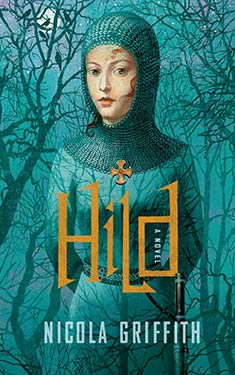WoGF Review: Hild by Nicola Griffith
 Alix Heintzman (alixheintzman) recently earned herself a graduate degree in history from the University of Vermont, and has circled back to her Old Kentucky Home with her partner Nick Stiner. She spends her time semi-desperately repairing the abandoned house they just bought, writing history high school curriculum, and reading fantasy books. She reviews books on her blog, The Other Side of the Rain, and is a staff reviewer at Fantasy Literature.
Alix Heintzman (alixheintzman) recently earned herself a graduate degree in history from the University of Vermont, and has circled back to her Old Kentucky Home with her partner Nick Stiner. She spends her time semi-desperately repairing the abandoned house they just bought, writing history high school curriculum, and reading fantasy books. She reviews books on her blog, The Other Side of the Rain, and is a staff reviewer at Fantasy Literature.
 Nicola Griffith’s Hild: A Novel is something rare. It’s a historical fantasy, but it’s not a magical adventure, a bodice-ripper, a military drama, or even a political thriller. It’s not the kind of book you dive into and finish a day later and forget almost immediately. Hild is a whole world with a taste and texture of its own. It lingers.
Nicola Griffith’s Hild: A Novel is something rare. It’s a historical fantasy, but it’s not a magical adventure, a bodice-ripper, a military drama, or even a political thriller. It’s not the kind of book you dive into and finish a day later and forget almost immediately. Hild is a whole world with a taste and texture of its own. It lingers.
The story is a fictionalized (but not fantasized) vision of the early life of Hilda of Whitby, a slightly obscure 7th century English saint. The plot clings to the trailing skirts of a young girl who becomes the seer to a medieval King. Amid a sea of old English names and places (Ǽthelfrith, Ealdwulf, Caer Loid, Hwicce), Hild uses her influence and intelligence to navigate the choppy waters of politics and war. It’s a slow, beautiful story full of winter evenings by the hearth and long rides through the countryside and sudden spurts of violence. It’s simultaneously about the huge, grinding ways that cultures change, the depth and complexity of the past, and a young girl making her own way.
In the spirit of full confession, Hild is not technically fantasy. There’s no magic performed in the story. Merlin doesn’t stroll in halfway through and have a magical showdown with Morgan le Fay, and there aren’t any dragon sightings or wood sprites or Faeries spelled with an ‘e.’ Hild’s own magic as a seer is a combination of artifice, mystery, and her own fierce observational intelligence. But it does feel like fantasy, and not just because we’ve been hardwired to expect sorcery whenever we see a sword.
It feels like fantasy because, in 7th century England, the lines between the rational and supernatural, religious and superstitious, magical and real, had simply not been created yet. Those boundaries were built over the next thousand years, constructed from the exclusivity of Christianity, the skepticism of the Age of Reason, and the aggressive modernism of the 19th century. But in the 600s, life was still a constant series of negotiations between the material and magical worlds. Hild’s youth and brilliance are not objective realities, but tools to manipulate the mysteries of her world.
 More broadly, Griffith has created a medieval England that is free of the colorful revisions of the 19th and 20th centuries. Walter Scott and T.H. White and the whole Arthurian revival haven’t infected Hild’s England with their mostly-nonsense about codes of chivalry and round tables. Instead, we find an England that is in a constant state of cultural upheaval. Borders change, mythologies mix, and languages evolve. Even greater changes lurk on the horizon: Christianity is gaining its second toehold, bringing along a new Church hierarchy and a culture of literacy. Nicola Griffith didn’t write the medieval past she imagined, but the one she painstakingly researched.
More broadly, Griffith has created a medieval England that is free of the colorful revisions of the 19th and 20th centuries. Walter Scott and T.H. White and the whole Arthurian revival haven’t infected Hild’s England with their mostly-nonsense about codes of chivalry and round tables. Instead, we find an England that is in a constant state of cultural upheaval. Borders change, mythologies mix, and languages evolve. Even greater changes lurk on the horizon: Christianity is gaining its second toehold, bringing along a new Church hierarchy and a culture of literacy. Nicola Griffith didn’t write the medieval past she imagined, but the one she painstakingly researched.
The subtle decisions of syntax and vocabulary are crucial to this intricate world-building. A hefty number of old English and Celtic and Germanic and Latin and British terms work their way into the story, which is at first disorienting (what is a gesith? Or a wealh? Or, lord help me, a gemaecce?). It’s not dissimilar from the feeling you get from epic science fiction when it plops you onto a new planet and starts chatting about spice-mining or the Spacing Guild or the Mri. But, as other reviewers have already noted, the past is at least as “alien” as the future or an unknown planet.
Griffith’s language is at its best in the descriptions of the natural world. Every bird and flower has its name, and every shift in the weather has meaning. There’s something about the lyrical, effortless way she integrates nature and the human experience that makes it terribly real. The Anglisc language drums “like apples spilt over wooden boards, round, rich, stirring,” as compared to the “otter-swift” British (5). Hild herself is a watcher, an observer, and the habits and motions of the natural world have shaped her thoughts.
No amount of research and lyricism would save this book if it weren’t for Hild herself: A girl in and of the past, navigating a complex and patriarchal world. Griffith hasn’t caved to the strong-woman-defies-patriarchy-and-becomes-a-legit-knight tendencies of fantasy with female leads (although, admittedly, Hild does learn to use a staff). Hild gains power and influence for herself and her family, but not by hacking up bad guys and teaching everyone about equal rights for women. Instead, her weapon is her intelligence. She also isn’t motivated by some personal horror-story—she isn’t strong because she was “broken first,” she’s strong because she has natural ambitions and hopes of her own. She changes the world not because she’s man-like, but because she’s human-like.
Originally published at Fantasy Literature.



















 Full Details
Full Details


No comments yet.
Sorry, the comment form is closed at this time.